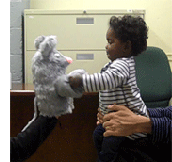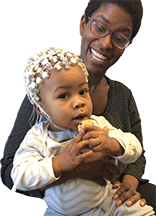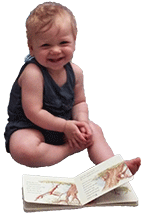 We all know that a child's experiences help to determine how that child grows and develops. In the NEED lab, we are trying to better understand how this works. What are the factors in a child's environment that predict how he or she will develop, and what are the particular developmental outcomes that we should pay the most attention to?
We all know that a child's experiences help to determine how that child grows and develops. In the NEED lab, we are trying to better understand how this works. What are the factors in a child's environment that predict how he or she will develop, and what are the particular developmental outcomes that we should pay the most attention to?
In terms of child experience, we ask how different factors in the child's environment, like access to material resources, richness of language exposure, and parenting style all work together to predict differences in outcomes. We are also interested in how aspects of the child's chemical environment, like exposure to prenatal alcohol or secondhand smoke, might interact with social risks.
In terms of child development, our interests are two-fold: First, we are interested in cognitive development, including the kinds of differences we see in the way children develop language, memory and self-control. Second, what can we say about how experience influences children's brain development? Ultimately we hope to use the information gained from these studies to inform educational and public health interventions to promote healthy development for all children.
Dr. Noble will be accepting a new PhD student for the fall of 2017!
Interested applicants should apply through the Teachers College Developmental Physchology PhD program. See more about the program here.
Want to participate? SIGN UP HERE!
NEED LAB UPDATES
December 2016 - The NEED Lab had 5 presentations accepted for the SRCD 2017 conference. See you in Austin!
March 2016 - The American Academy of Pediatrics just issued its first ever policy statement on poverty. Take a look here!
February 2016 - Check out Dr. Noble's lecture, Socioeconomic Status, Children and Brain Development, from the Brain Insight lecture series, sponsored by Columbia's Zuckerman Institute.
December 2015 - Six abstracts from our lab were accepted to the 2016 Annual Meetings of the Cognitive Neuroscience Society and Eastern Psychological Association. See you this spring in NYC!
November 2015 - The BabBLE study has launched! Sign up to participate with your 6-12 month old.
July 2015 - We've moved! Come visit our new home at Teachers College, Columbia University!
March 2015 - Dr. Noble and colleagues in the Pediatric Imaging, Neurocognition, and Genetics (PING) study found SES disparities in brain structure throughout early childhood and adolescence, published this month in Nature Neuroscience. Our first paper with the PASS Network was also published in Developmental Psychobiology this month, reporting SES disparities in language and memory in the first two years of life.
NEED LAB IN THE NEWS
October 2015 - One of our postdocs, Dr. Natalie Brito, participated in a roundtable discussion about poverty and brain development at the Society for Neuroscience's Annual Meeting, covered in Scientific American.
October 2015 - Check out The Bloomberg View's excellent piece on poverty, featuring our work.
October 2015 - Dr. Noble wrote an op-ed on poverty and brain development, featured in the Washington Post and the Chicago Tribune.
June 2015 - Excited about the mention of our Nature Neuroscience article in The New Yorker's piece on What Poverty Does to the Young Brain!
April 2015 - Our Nature Neuroscience publication was featured along with other studies on brain science and the achievement gap in The Washington Post! Dr. Noble also appeared on Huffington Post Live to discuss our findings. Also check out this new piece in the Huffington Post.
March 2015 - Our Nature Neuroscience publication on SES disparities in brain development is receiving worldwide attention. Dr. Noble has been featured in national pieces by NBC News, The Washington Post, PBS, Forbes, AAAS, and Psychology Today. Internationally, she has been interviewed on The BBC and Swiss Radio, and appears in pieces by The Guardian and the New Zealand Herald.
March 2015 - A Letter to the Editor written by Dr. Noble and our colleague Dr. Lisa Gennetian was published in the Wall Street Journal, in response to an op-ed suggesting that the link between income and SAT scores is based primarily on parent IQ.
December 2014 - Check out Lab Manager Samantha Melvin's post, It's Not Just Us: We Can't Fight Poverty Without Collaboration, on the APA's Psychology Benefits Society Blog! It is part of a great series on how psychology can contribute to discussions of poverty in light of 50 years of the War on Poverty.
July 2014 - Dr. Noble was featured along with our colleague Dr. Anne Fernald in a piece about the importance of talking to babies in a story on Radio Health Journal! She was also quoted in a Slate article about the necessity of researching child development across the socioeconomic spectrum, citing the tendency of much developmental research to ignore such important factors.
June 2014 - Dr. Noble was interviewed for an article on NBC Today about the CDC's new report on falling induction rates. She cites her work on the relationship between gestational age and later educational outcomes as evidence for the importance of waiting until at least 39 weeks to give birth whenever possible.
February 2014 - Dr. Noble recently spoke in a symposium at the American Association for the Advancement of Science (AAAS) Annual Meeting in Chicago, IL. She is featured in the Associated Press and Agence France-Presse for her talk on SES disparities in language areas of the brain, as well as in the Associated Press article Tips for Talking to Babies, Toddlers. She was also featured in The Economist for this presentation, so make sure to watch the video for a closer look at the NEED Lab's work!
November 2013 - Dr. Noble was quoted in the Swiss national newspaper, Neue Zuercher Zeitung.
August 2013 - Dr. Noble was recently interviewed for a Reuters Health article on neurodevelopmental outcomes in extremely premature babies, as well as a Live Science article on the relationship between poverty and cognitive ability.
March 2013 - The Pennsylvania Gazette, the alumni magazine for the University of Pennsylvania, featured Dr. Noble's work that shows a relationship between SES and children's brain development.
.



